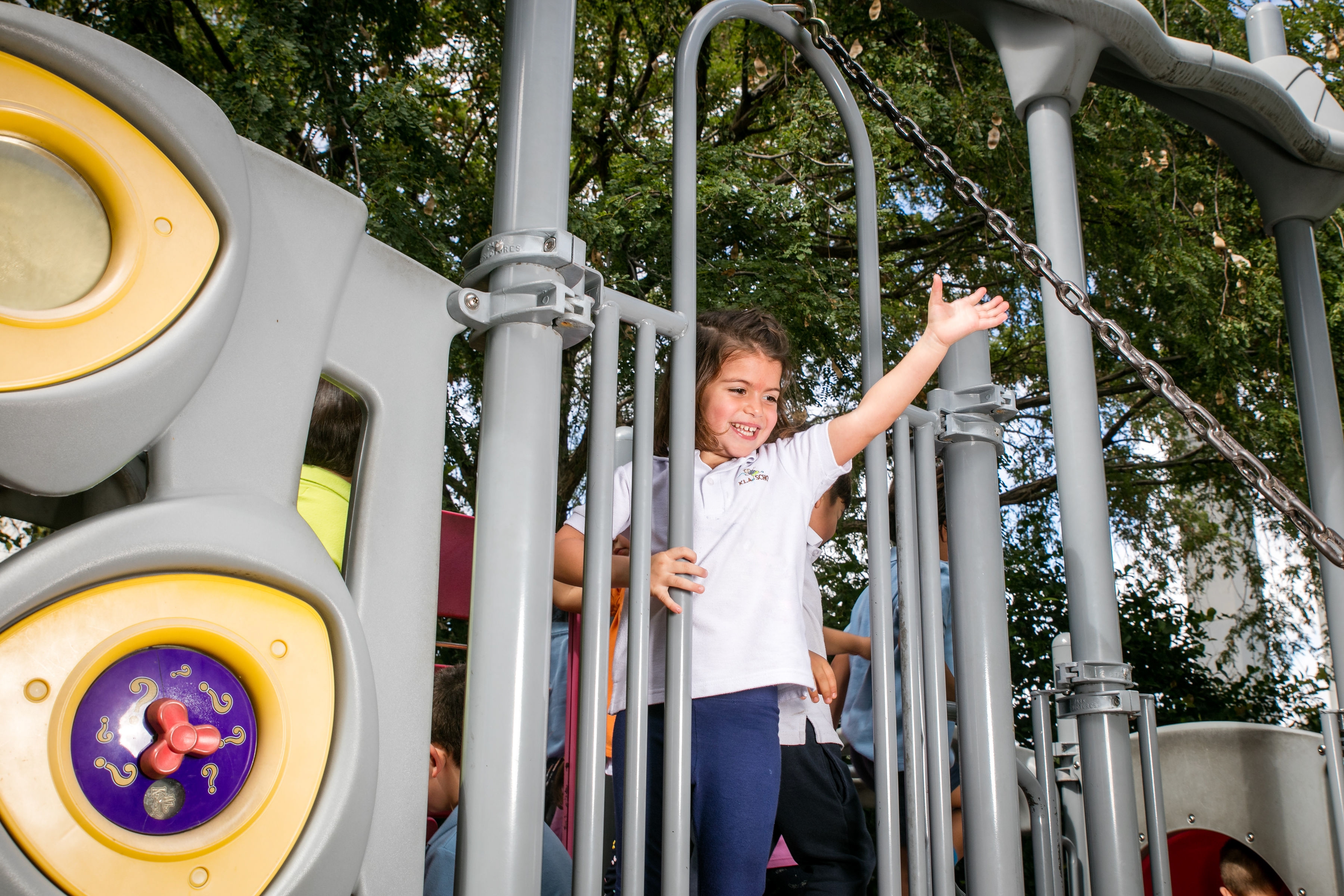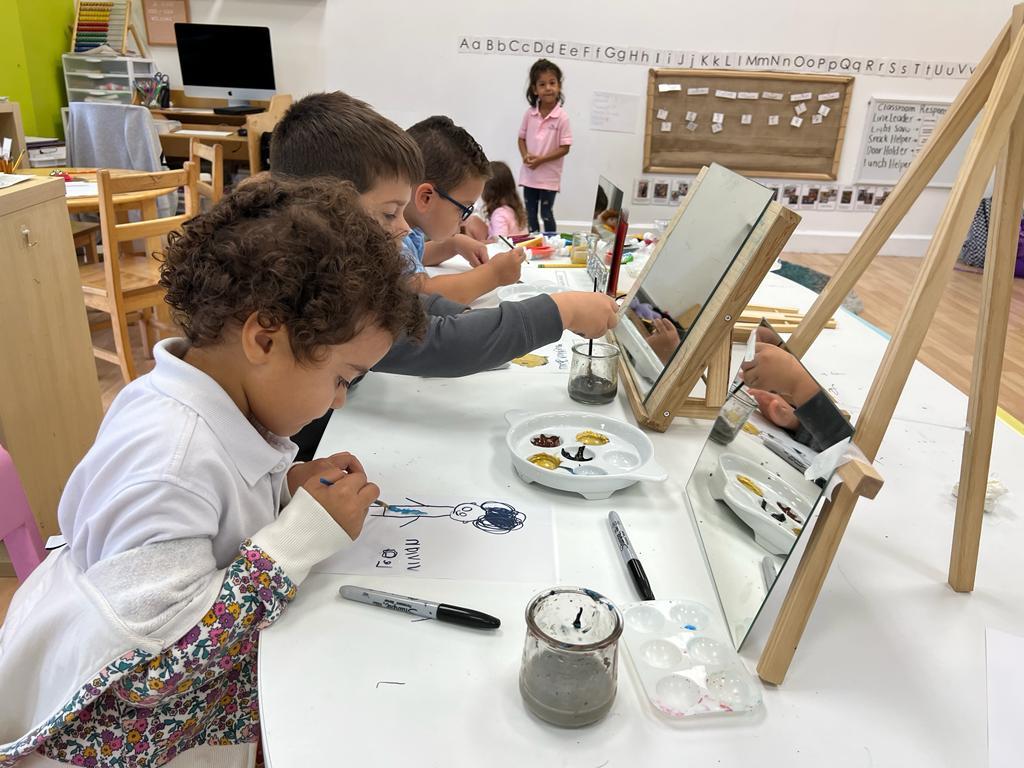Key Benefits and Activities to Boost Social Skills
Topics: Child Development
Age Range: Preschool
Little children must develop their social skills as they interact with other children and adults for the first time. Effective communication, collaboration, and conflict resolution are vital for this development and form the basis for later school achievements and relationships. Thus, preschool is important for developing these skills and allowing children to relate to their peers in a safe setting.
Integrating purposeful, play-oriented activities that promote teamwork and effective communication is essential for fostering social skills in preschool-aged children. A well-rounded preschool program, particularly one inspired by the Reggio Emilia approach, promotes social growth through exploration, creativity, and peer interaction. Here are some key benefits of social skills development and strategies for nurturing them effectively.
Why Developing Social Skills Matter in Early Childhood
Social skills are more than just manners. They include the ability to express emotions, understand how others feel, and work well with others to achieve shared goals. Strong social skills enable kids to build meaningful relationships, manage stress well, and resolve problems in a positive way.
These skills help toddlers make a smoother transition to kindergarten and later educational phases. Young children are better prepared to flourish in structured settings and participate in cooperative group activities when they learn to share, listen, and empathize. These fundamental abilities are essential for developing a lifetime capacity for interpersonal connection, controlling emotions, and boosting self-esteem.
How Preschool Environments Foster Social Skills Development
A preschool setting is a great way for children to help them develop and improve their social skills. Children are given many chances to practice collaboration and communication through planned activities, unstructured play, and group projects. The emphasis on teamwork and respect for other points of view creates a lively environment that is ideal for social learning in environments that are modeled after the Reggio Emilia method.
Children can learn from their experiences in these settings because teachers encourage relationships rather than impose them. Through open-ended activities incorporating group decision-making, young learners are encouraged to express their ideas, consider others' opinions, and reach a consensus. The developmental stages preschool-aged children typically go through align well with our experiential, child-focused philosophy.
Activities to Boost Social Skills Development in Preschool
Intentional activities can greatly enhance social development during the preschool day. Some effective strategies for encouraging social interaction include the following:
Group Art Projects
Teamwork and communication are fostered by collaborative art. Let them make something using materials like clay, paint, or large sheets of paper. This activity allows them to share resources, assign responsibilities, and celebrate joint successes.
Dramatic Play
Children can practice empathy, investigate roles, and hone their problem-solving skills through pretend play. Creating a theatrical play space with toys, costumes, and themes, such as a doctor's office or grocery store, encourages creativity and socialization. Youngsters learn to settle disputes inside their stories, take turns, and adhere to social norms.
Circle Time Discussions
Teaching communication skills can be accomplished through morning meetings or circle-time discussions. Encourage each youngster to share by starting with simple topics like favorite colors or weekend activities. Additionally, this approach emphasizes respect for others' viewpoints, active listening, and taking turns.
Team-Building Games
Cooperative games foster teamwork by having players build block towers in pairs or complete obstacle courses cooperatively. These projects need coordination, collective decision-making, as well as the building of mutual respect and confidence.
Storytelling and Puppet Shows
Storytelling activities help youngsters develop their imaginations while also boosting their capacity to convey their thoughts and feelings. Puppets may help youngsters express themselves, while group storytelling promotes a sense of community.
Gardening Projects
A collaborative outdoor activity that fosters accountability and teamwork is planting a garden. Task assignments, tool sharing, and goal-oriented activities teach kids the importance of teamwork.
Music and Movement
Group dancing and singing improve coordination and unity. Children learn to follow instructions and work as a team through activities like circle dances and instrument-based rhythm creation.
The Role of Teachers and Caregivers in Developing Social Skills
Positive social behaviors need to be modeled and reinforced by adults. Early childhood educators and caregivers can:
- Encourage play: Watching the children while they're engaged in activities and intervening only to settle disputes or promote collaboration.
- Model empathy: Show kids how to relate to the feelings of others by interacting with them in a kind and understanding manner.
- Encourage peer assistance: Encourage similar behaviors, highlight beneficial events, and recognize teamwork.
- Create inclusive settings: Celebrate diversity and teach respect for different points of view via stories, talks, and activities.
Benefits of Developing Social Skills in Preschool
There are numerous benefits for preschoolers who develop their social skills, including:
- Better emotional regulation: Self-control is improved, and tantrums are decreased when emotions are understood and appropriately managed.
- Improved cognitive development: Critical thinking, language development, and problem-solving are all facilitated by social engagement.
- Stronger friendships: Deeper, more meaningful peer connections result from cooperative play and empathy-building exercises.
- Readiness for school: Familiarity with group dynamics and collaborative tasks prepares children for the structure of kindergarten and beyond.
Building Social Skills at Home
Parents and caregivers can extend social learning beyond the classroom with simple activities:
- Family game nights: Board games teach turn-taking, patience, and rule-following.
- Cooking together: Preparing meals as a family encourages teamwork and communication.
- Community involvement: Visiting libraries, parks, or community events exposes children to social settings and new friends.
- Storytime discussions: Reading books about friendship and emotions prompts conversations about social situations and appropriate responses.
The Reggio Emilia Influence
The Reggio Emilia concept is an ideal framework for social skill development because it strongly emphasizes cooperation, communication, and respect for children's opinions. Central to this approach is the “Hundred Languages of Children,” which celebrates diverse forms of expression. Activities inspired by Reggio Emilia, such as painting, storytelling, and scientific inquiry, promote collaboration and mutual respect.
Preschool programs informed by this idea frequently use project-based learning, in which children collaborate to solve issues and develop solutions. Teachers serve as facilitators, promoting open communication and collaborative decision-making. This environment fosters a sense of community by allowing kids to learn from it.
Children benefit from these cooperative activities by gaining important social skills, including empathy, teamwork, and active listening.
Children gain confidence in their ability to express themselves while respecting the views of others when they take part in group projects and discussions. This method fosters creativity and critical thinking while fortifying social foundations.
Encouraging Growth Over Time
Social skill development is a slow process that advances with consistent practice and support. When children feel appreciated and supported, they thrive. Teachers and other caregivers must so establish secure spaces for social learning.
Children's ability to navigate complex social situations improves as they mature. Preschool experiences establish the framework for these skills by instilling confidence and flexibility. When youngsters can communicate, collaborate, and empathize, they can better overcome hurdles and create enduring relationships.
Create Opportunities for Your Child's Social Skills Development
Preschoolers gain social development opportunities that last well beyond their early years. A lifetime of fruitful relationships is paved with activities that promote collaboration, empathy, and clear communication. Adopting preschool social skills development techniques as teachers and caregivers guarantees that kids acquire the self-assurance and resources they need to succeed.
Children develop important problem-solving and teamwork skills via group activities, supervised play, and a focus on healthy peer relationships. Encourage cooperation, creativity, and connection in your child's activities so that they can realize their full social development potential.
Contact us right now to learn more about our cutting-edge Reggio Emilia early childhood education programs, which are intended to promote the development of social skills and a love of learning!

